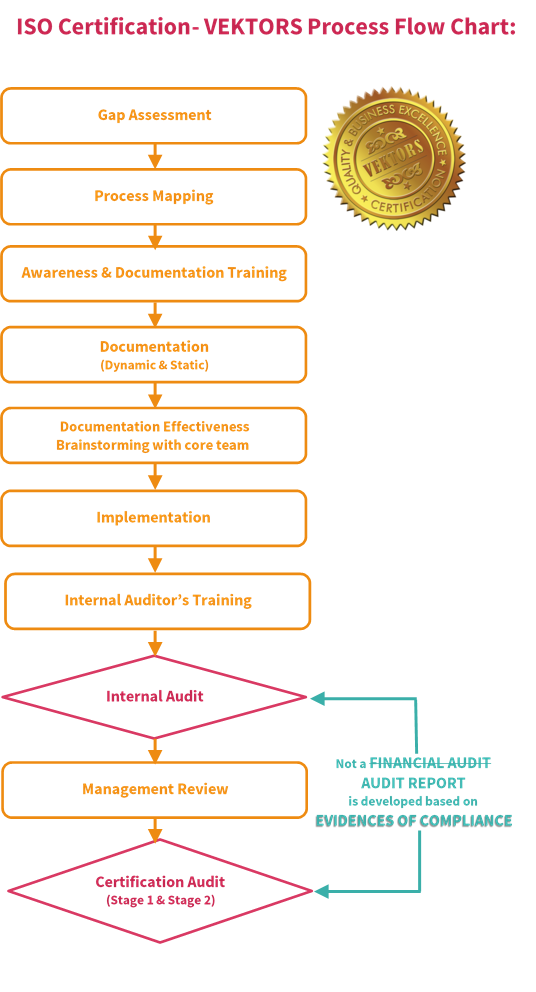ISO 22000:2018 and HACCP

A Brief about Vektors:
Vektors is a growing team of Quality & Business Excellence consultants, a leading provider of conformity & compliance based solutions. 18 yrs old & counting! We offer Consulting, Auditing and Training services, helping our customers get certified.
A Brief about ISO 22000:2018
ISO 22000 Food Safety Management System is a process control system designed to identify and prevent microbial and other hazards in food production and entire food chain. HACCP includes steps designed to prevent problems before they occur and to correct deviations through a systematic way as soon as they are detected.
Such preventive control systems with documentation and verification are widely recognized by scientific authorities and international organizations as the most effective approach available for producing safe food.
HACCP / ISO 22000 enables the producers, processors, distributors, exporters, etc, of food products to utilize technical resources efficiently and in a cost effective manner in assuring food safety.
The ISO 22000:2018 standard outlines Food Safety Management System Requirements for any organization in the food chain, and is one of a family of standards focused at the development, implementation and improvement of a food safety management system.
Other Food Safety Management Certifications:
Today we have various internationally accepted standards to choose from depending on the type of food or food processing for example
- FSSC 22000
- BRC-Food
- BRC- Packing
- HACCP
- Global Gap
- SQF and
- KOSHER etc.
These standards help us to control the food processing and achieve compliance to the product requirements.
The HACCP (Hazard Analysis and Critical Control Point) certificate is awarded to the organization showing compliance to the HACCP standard during certification audit. Hazard analysis is done to identify the associated critical control points within the food processing while implementing the HACCP standard. An effectively controlled process dependent quality management system is an ideal platform to establish, maintain, monitor and manage the system.
The ISO 9001:2015 standard (Quality Management System) is based on the principal of establishing a process depended and an effectively controlled management system with a strong focus on customer’s satisfaction. The effectively controlled processes leads to effectively controlled system which is achieved through a PDCA cycle ie. Plan, Do, Check and Act.
ISO 22000:2018 standard has been established on the guidelines similar to that of HACCP standard.
Who should use ISO 22000:2018?
Since ISO 22000 is a generic food safety management standard it can be used by any organization directly or indirectly involved in the food chain including- Farms, Fisheries and Dairies, Processors of Meats, Fish and Feed, including Manufacturers of soups, snacks, bread, cereal, beverages, canned and frozen food, etc as well as food service providers such as restaurants, fast food chains, hospitals and hotels.
Supporting services should not be forgotten and providers of food transportation storage and distribution, catering services as well as product suppliers for equipment, additives, raw materials, cleaning and sanitizing products, packaging. In short if your products touch the food industry or the food we eat, part or all of the ISO 22000 requirements will apply.
________________________________________________________________________________________________________________
Difference between ISO 22001:2018 & FSSC 22000
________________________________________________________________________________________________________________
Global Food Safety Initiative (GFSI) Certification. Due to complex challenges in today’s food supply chain, many of the world’s largest food retailers are mandating supplier certification to Global Food Safety Initiative (GFSI) schemes, which include SQF, BRC, IFS, FSSC, GLOBALG.A.P. and BAP and CanadaGAP.
GFSI was established to ensure confidence in the delivery of safer food to consumers, while continuing to improve food safety throughout the supply chain. These global standards address food, packaging, packaging materials, storage and distribution for primary producers, manufacturers and distributors.
However, the differences are more extensive but a few to mention are as follows:
ISO 22000 is not recognized by GFSI.
ISO 22000 is broad in scope.
FSSC 22000 is recognized by GFSI.
FSSC has a more limited scope. Current scopes included are: farming, perishable animal products, food processing, feed production, food ingredients and food packaging material manufacturing.
Most companies will benefit by choosing FSSC 22000 and achieving a GFSI recognized certification. This is because many companies require that their suppliers be certified to a GFSI recognized standard. ISO 22000 is not recognized by GFSI.
FSSC 22000 is a certification scheme that absorbs ISO 22000 and contains a more extensive list of standards to be met by the enterprise.
The background of ISO 22000 is wider than that of FSSC 22000. This is due to the fact that ISO 22000 contains less rigid requirements for the certification authority and the requirements for the enterprise itself, to its infrastructure and documentation maintenance.
FSSC 22000 contains more rigid requirements for enterprise infrastructure, due to the technical specifications of the basic pre-industrial programs. Moreover, the implementation of these requirements should be documented in the form of regulations and other documents.
Requirements for the authority which will carry out certification for compliance with the requirements of FSSC 22000 more rigid: it must be a corresponding accreditation scope and accredited auditors. Moreover, there are very few accredited auditors and certification bodies nowadays.
For certification scheme FSSC 22000 it is necessary to develop and implement the same procedures and documents as for ISO 22000. However, in addition there should be a procedure of traceability and other documents depending on the specifics of production (for example, the procedure for accidents during transportation of the product etc.)
The procedure of certification is not different. However, the requirements of FSSC 22000 scheme are more extensive and rigid, so the certification under this scheme is a very long and labour-intensive process.

